briwy
Super Poster
VIP Member
Millers just emailed again to say that a syringe and tube will be available as an option with the kit.
All,
I ordered on line and did it myself. Results back this morning.......bad news...failing on silicon (38 v 15 ppm max) and aluminium (65 v 30 ppm max). This oil has only done ~ 3900 miles (oil should be good for 24000 miles)!!!!!! Most likely root cause is EGR cooler/valve assembly........now trying to decide approach with VW, whom to date have denied the problem exists, offered no material advise and will not pay for any diagnostics. Not happy!
Excuse confusion....I meant silicon. I mentioned it as it was reported as out of expected allowable range in my oil test results.@veg_frenzy, you've been introducing silica into the mix (well silica in your question then silicon in your results post... Did you mean silica?).
Can I ask what the silica levels might indicate and where could high levels be arising from?
@deccauk: Can ref post #171, do you have any Si numbers to share?
Thanks to all.
Regarding the "AlSi10Mg(Fe)" stamp.....not sure we can assume this has not changed between EGR cooler variants or something else may have changed. I'm guessing we'd never get this out of VW!
Thanks. I assume that was the last test result. Do you have numbers for the previous tests also? Thanks.Yes - my silicon was 8ppm.
I wouldn't be at all surprised if there is absolutely no difference in the EGR cooler part of the assembly between any of the VW part # suffixed variants (with the possible exception of the non-suffixed variant - well known for failure on the first CFCA engined models).
Sorry if I wasn't clear but, for the Pierburg manufactured item (and I'm not aware of any other manufacturer), all variants (I can find images of) have exactly the same stamping (casting) on the part - unlike the VW part number, etc. which is just affixed to the part (sticker?). So I think we can be pretty sure they are made from the same AlSi10Mg(Fe) material (which is an internationally recognised nomenclature) ... right up until someone finds evidence to the contrary anyway.
I believe that the VW part number suffix (A, C, D) is more likely to pertain to manufacturing/design differences or (equally likely in my opinion) is just tied to a VW manufacturing/order 'batch', possibly related to the attached electronic EGR valve (which can't be ordered separately from the cooler) or engine management software version (major release).
I wouldn't be at all surprised if there is absolutely no difference in the EGR cooler part of the assembly between any of the VW part # suffixed variants (with the possible exception of the non-suffixed variant - well known for failure on the first CFCA engined models).
According to the Facebook page (and also the German forum), the D version of the cooler has some sort of coating over the fins inside the cooler, in order to avoid them corroding. Apparently condensing acids in the returning exhaust stream attack the alloy and this is a known problem with this type of alloy.I wouldn't be at all surprised if there is absolutely no difference in the EGR cooler part of the assembly between any of the VW part # suffixed variants (with the possible exception of the non-suffixed variant - well known for failure on the first CFCA engined models).
... I have the non-suffixed variant, and have no issues yet after 38,000 miles. The thought that is now rattling around inside my head is that of driving style. If hard driving results in higher EGR cooler temperatures, will that exacerbate or accelerate EGR deterioration?
Perhaps I am just lucky, but I am retired, never in a hurry and always keen to get good mpg!
Interesting. I was thinking the same.....I understand form some experts that the EGR valve itself is prone to being stuck open, thus leading to continual exhaust gas recirculation on both piston strokes. This in turn depletes oil dispersancy and thus accumulates soot, which then causes liner wear. Question is, would VW replace the valve only at less cost? I doubt it. Besides there may well be other changes that they have made to the cooler to improve it's corrosion (e.g. coatings).
Thanks. I assume that was the last test result. Do you have numbers for the previous tests also? Thanks.
I've only done one test.
Apologies deccauk....I thought you did multiple tests, but just re-read that it was someone on the German TX forum (3x tests, 2 after the change of EGR cooler). If you're in contact with them, any chance you could ask for corresponding Si numbers for the 3x test they made? Many thanks.
According to the Facebook page (and also the German forum), the D version of the cooler has some sort of coating over the fins inside the cooler, in order to avoid them corroding. Apparently condensing acids in the returning exhaust stream attack the alloy and this is a known problem with this type of alloy.
The coating presumably alleviates this corrosion but for how long, I guess, is unknown!
...
*I'll try to attach a couple of pictures here to help make the point, taken from "new old stock" EGR assembly. In case the images don't stick around, the photographic evidence here shows (or appears to show) that the "old" VW "A" variant is associated with the "current" Pierburg assembly part number.
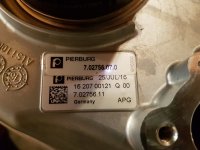
Especially when you see pictures like this, with the suffix letter hidden and version 07 and 11 on the same sticker:
Especially when you see pictures like this, with the suffix letter hidden and version 07 and 11 on the same sticker:
View attachment 19512
You have been down the same road as me regarding digesting all the information on facebook and the TX forum, and your conclusions are pretty much the same as mine.
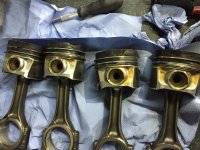
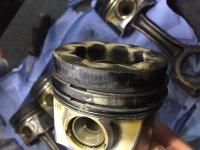
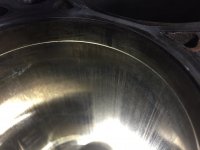
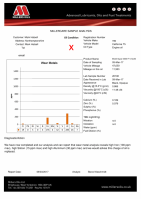
The VW California Club is the worlds largest resource for all owners and enthusiasts of VW California campervans.

